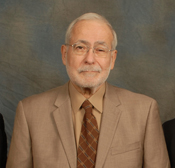Alumnus Barry Kramer worked as a foreign correspondent at the height of Vietnam War
Barry Kramer considers himself lucky. Raised in what he describes as a tenement in Newark, he and his parents were able to scrape together enough money to enable him to earn an undergraduate degree from Rutgers in 1962, get a graduate degree from Columbia University a year later, and spend three decades traveling the world working as a journalist and senior editor for the Associated Press and The Wall Street Journal.
"Rutgers was a turning point in my life,” says Kramer who has established the largest single scholarship endowment given to the Department of Journalism and Media Studies at the School of Communication and Information. “The education I received opened my eyes to the opportunities that were out there and I always knew that I needed to repay Rutgers for what it did for me.”
The Barry S. Kramer Endowed Scholarship Fund in the amount of $200,000 will be used to support the education of undergraduate journalism students. Kramer has been making donations to the School of Communication and Information since 2007 when he started the scholarship with a $10,000 gift followed by another $15,000 in donations over the last three years.
Another $5,000 donation is scheduled to be made in December. This gift is part of the university's seven-year, $1 billion initiative, “Our Rutgers, Our Future: A Campaign for Excellence,” which focuses on meeting the university’s most pressing academic and financial needs

“I always thought I could write well, but when I was in high school it never occurred to me that I could make money at writing,” says Kramer, who joined WRSU, where he was a news director and record-spinning disc jockey, and later worked as a campus correspondent for the Herald Tribune in New York, a stringer for the Associated Press, and a news writer and announcer for WCTC Radio in New Brunswick. “There was no going back from there.”
The longtime newspaper reporter, who retired from The Wall Street Journal in 2001, spent about six years as a science writer at the beginning of his Journal career covering science, medical advances, and the research being done at pharmaceutical companies. Later, he worked as a foreign correspondent, covering Asia.
Kramer started working as a journalist in 1963 at the Associated Press in Newark, followed by a stint in the Army Reserves, where after basic training he spent 12 months at the Defense Language Institute learning Chinese. Subsequently, AP sent him to Vietnam at the height of the war. After two years, Kramer was forced to leave Vietnam and return to Fort Bragg in North Carolina in 1968 to fulfill the rest of his two-year Army Reserve commitment. He returned to AP briefly before joining The Wall Street Journal.
Spending many years as a Journal Asia correspondent based in Hong Kong, Kramer covered some 30 countries, from Afghanistan to India, Vietnam, and China. After returning from Asia, he became a senior editor on the Journal’s foreign desk and was the deputy foreign editor when he retired. While today’s young reporters have to be knowledgeable about digital and social media as well as the precepts of traditional journalism, Kramer remembers the days when one of the biggest challenges correspondents faced overseas was just getting their stories back to the home office for publication.
“I remember the times when telephone and teletype communications with the rest of the world would be cut off in Saigon and in those days there were no computers or satellite transmission,” Kramer says. “So you had to type the story out on paper, carry it to the airport, and hope that a departing traveler to Hong Kong would agree to carry it to the bureau there for transmission back to New York.”
Still, he looks back at his days as a journalist and has absolutely no regrets about his career choice.
“My career fit in with the golden days of journalism,” says Kramer. “It’s sort of sad what is happening today; but I am glad that there are still good journalism schools continuing to train future journalists on what it really means to be fair, balanced and ethical.”